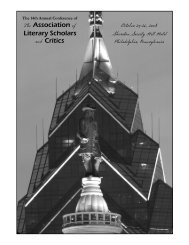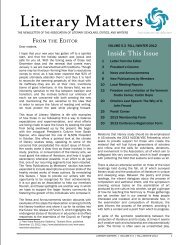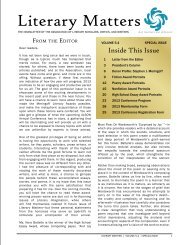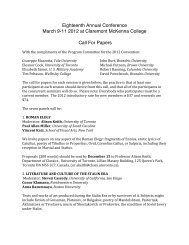Literary Matters - Association of Literary Scholars, Critics, and Writers
Literary Matters - Association of Literary Scholars, Critics, and Writers
Literary Matters - Association of Literary Scholars, Critics, and Writers
Create successful ePaper yourself
Turn your PDF publications into a flip-book with our unique Google optimized e-Paper software.
From The Editor (continued from page 1)Armed with a mastery <strong>of</strong> both Russian <strong>and</strong>Polish scholarship <strong>and</strong> a bracing style <strong>of</strong> argument,Cavanagh’s important <strong>and</strong> enthrallingbook illuminates the creative biographies <strong>and</strong>works <strong>of</strong> writers who from about 1917 to thedissolution <strong>of</strong> the Soviet bloc experienced,documented, tested, challenged <strong>and</strong> sometimessurvived the confrontation with the State [...] 1As she follows Mayakovsky, Akhmatova, Szymborska,Milosz, <strong>and</strong> others through the 20 th century, its poeticdevelopments <strong>and</strong> political polarizations, Cavanaghpoints out, as Kahn puts it later in his review, “the value<strong>of</strong> lyric poetry in sensitizing perception to detail <strong>and</strong>specificity, <strong>and</strong> in sharpening our sense <strong>of</strong> individualagency <strong>and</strong> responsibility.” 2Fast on the heels <strong>of</strong> this acclaimed work <strong>of</strong> scholarshipare two works <strong>of</strong> literary translation by Cavanagh—one just published <strong>and</strong> another forthcoming. WisławaSzymborska’s Here, which Cavanagh co-translated withStanislaw Baranczak, is out from Harcourt this October;<strong>and</strong> her translation <strong>of</strong> Adam Zagajewski’s latest book <strong>of</strong>poems, Unseen H<strong>and</strong>, will be released in the spring <strong>of</strong>2011 from Farrar Straus & Giroux. This last includes thepoem “Piano Lessons,” which Zagajewski <strong>and</strong> Cavanaghcontributed for the beautiful broadside that is the first inthe ALSCW’s new Broadside Series.Another past ALSCW president, Christopher Ricks,has been characteristically prolific this year. In March<strong>of</strong> 2010, Yale University Press published Ricks’ TrueFriendship, a study <strong>of</strong> Ge<strong>of</strong>frey Hill, Anthony Hecht,<strong>and</strong> Robert Lowell in relationship to T. S. Eliot <strong>and</strong> EzraPound. Taking its title from William Blake’s declaration“Opposition is true Friendship,” the book examines thecritical responses <strong>and</strong> poetical affinities among thesethree poets <strong>and</strong> their Modernist predecessors. Duringthis year Ricks has also published a new edition <strong>of</strong>Henry James’ What Maisie Knew (Penguin Classic,August 2010) <strong>and</strong> the anthology Joining Music withReason: 34 Poets, British <strong>and</strong> American, Oxford 2004-2009 (Waywiser Press, October 2010). Compiled fromreadings that took place at Oxford during Ricks’ tenurethere as Pr<strong>of</strong>essor <strong>of</strong> Poetry, Joining Music with Reasonincludes work from several poets affiliated with theALSCW as members, <strong>of</strong>ficers, or contributors to <strong>Literary</strong>Imagination: Greg Delanty, David Ferry, Mark Halliday,Saskia Hamilton, George Kalogeris, Marcia Karp,Ted Richer, Don Share, John Talbot, Harry Thomas,Rosanna Warren, <strong>and</strong> Rachel Wetzsteon.In addition to appearing in Ricks’ anthology, GregDelanty, who will <strong>of</strong>ficially take the reins as President1 Andrew Kahn, “Causework.” Times <strong>Literary</strong> Supplement. 10September 2010.2 Kahn, p. 14.<strong>of</strong> the ALSCW at the annual conference, has a number<strong>of</strong> publications to add to our list. In June <strong>of</strong> 2010,Delanty published the poetry collection The New CitizenArmy with The Combat Paper Press, which forms part<strong>of</strong> the Combat Paper Project. Through the CombatPaper Project, war veterans participate in papermakingworkshops to convert their used uniforms into works <strong>of</strong>art. The New Citizen Army is h<strong>and</strong> bound, with coversmade from “combat paper.”Several poems that originally appeared in Delanty’sCollected Poems, 1986-2006 (Carcanet Press, 2007),were included in The Penguin Book <strong>of</strong> Irish Poetry(September 2010), edited by Patrick Crotty. In addition,Delanty is also currently preparing an anthology, TheWord Exchange: Anglo-Saxon Poems in Translation, dueout in December 2010 from W. W. Norton & Company.There is one more presidential publication tomention: that <strong>of</strong> our current (for a couple <strong>of</strong> days still)ALSCW President. Susan Wolfson, who during thislast year has worked with unsurpassable energy <strong>and</strong>dedication to lead, to sustain, <strong>and</strong> to promote our<strong>Association</strong>, has just published Romantic Interactions:Social Being <strong>and</strong> the Turns <strong>of</strong> <strong>Literary</strong> Action (JohnsHopkins, October 2010). In this book, Wolfson turns toa variety <strong>of</strong> texts by women <strong>and</strong> men <strong>of</strong> the Romanticperiod to examine how their conceptions <strong>of</strong> authorshipwere formed through exchange between readers<strong>and</strong> writers. Moving from the political <strong>and</strong> culturalengagement <strong>of</strong> Charlotte Smith <strong>and</strong> Mary Wollstonecraftto the relationship <strong>of</strong> mutual interpretation betweenWilliam <strong>and</strong> Dorothy Wordsworth, <strong>and</strong> finally to Byron’scelebrity <strong>and</strong> its reception by several women poets, thebook qualifies the Romantic emphasis on individualityby revealing the complex artistic interactions underlyingthe idea <strong>of</strong> authorship.In presenting the Romantic conception <strong>of</strong>“interaction” in the introductory chapter <strong>of</strong> her book,Wolfson quotes a bemused Isaac Tayor, commentingin the 1830s on the reciprocity <strong>and</strong> exchange “whichat present is going on between readers <strong>and</strong> writers.” 3Jumping to the early 21 st century, I can’t help but think <strong>of</strong>the ALSCW as another site <strong>of</strong> this kind <strong>of</strong> “interaction”—if one that finds itself in a very different social realityfrom that <strong>of</strong> the British Romantics. I hope that, in thisbrief rundown <strong>of</strong> works published by ALSCW presidents,past <strong>and</strong> future, you find something that catches yourattention, creating <strong>and</strong> sustaining the <strong>Association</strong>’scommunity <strong>of</strong> readers <strong>and</strong> writers that thrive on literaryexchange. We look forward to extending <strong>and</strong> deepeningthese “interactions” at the conference in Princeton. Seeyou there! a3 Wolfson, Romantic Interactions, p. 3.- Leslie HarkemaLITERARY MATTERS | VOLUME 3.4 | YEAR-END 2010 3







